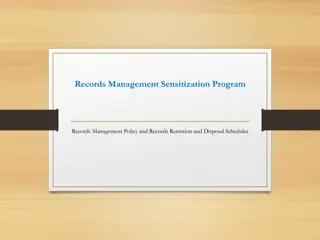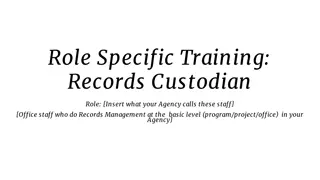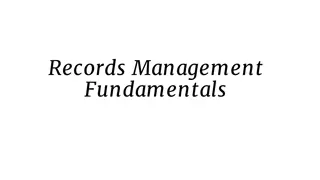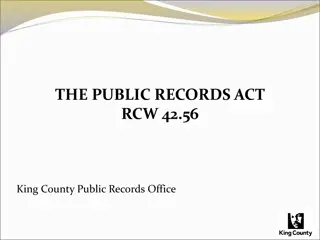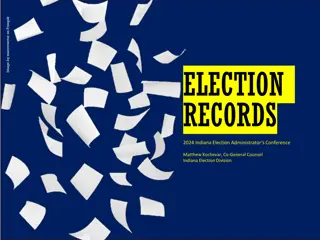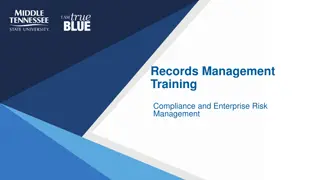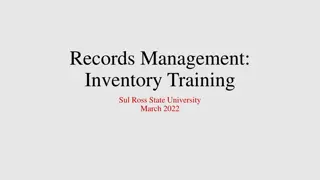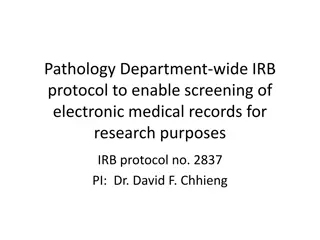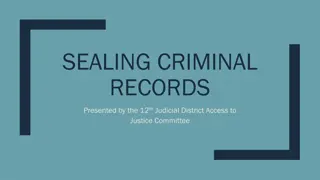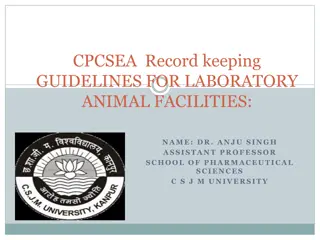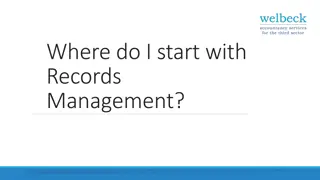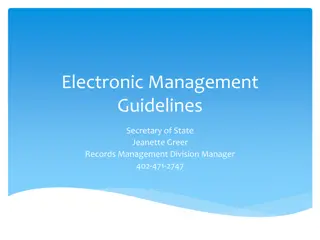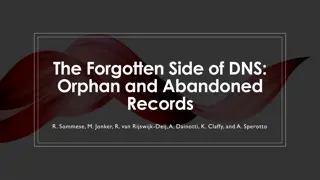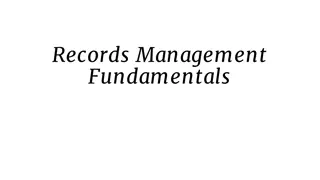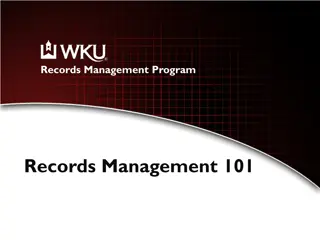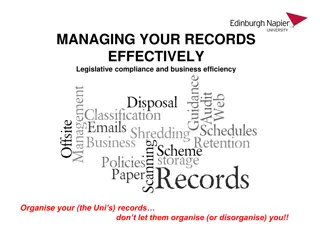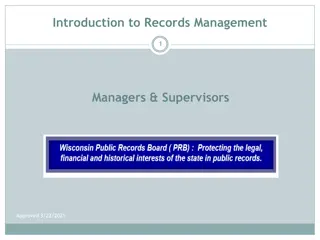Comprehensive Guide to Records Management at UND
Explore the essential aspects of records management at the University of North Dakota (UND), including records retention policy, lifecycle, definition of records, and mediums. Learn about the main objective of the Records Management department, records criteria, what constitutes a record, and what is not considered a record. Discover the various mediums through which records are maintained and the importance of official records.
Download Presentation

Please find below an Image/Link to download the presentation.
The content on the website is provided AS IS for your information and personal use only. It may not be sold, licensed, or shared on other websites without obtaining consent from the author.If you encounter any issues during the download, it is possible that the publisher has removed the file from their server.
You are allowed to download the files provided on this website for personal or commercial use, subject to the condition that they are used lawfully. All files are the property of their respective owners.
The content on the website is provided AS IS for your information and personal use only. It may not be sold, licensed, or shared on other websites without obtaining consent from the author.
E N D
Presentation Transcript
Records Management Email & Shared Drives Chris Carper Records Manager UND Office of Records Management
Agenda Records Management Overview Email Management Shared Drives Q&A
UND Records Management The main objective of the Records Management department is to assist university departments in managing their records throughout the entire life cycle of the records, from creation or receipt, through the use and maintenance stage, until final disposition of the records.
Records Life Cycle Creation or Receipt Disposition Use Maintenance
What is a Record? The North Dakota Century Code (NDCC 54-46-02) Record is a document, book, paper, photograph, sound recording or other material, regardless of physical form or characteristics, made or received pursuant to law or in connection with the transaction of official business. State Record is defined as A record of a department, office, commission, board, or other agency, however designated, of the state government.
What is a Record? Records Criteria Administrative Accomplishment of Work Example Employment Application Fiscal Evidence of Activities Example Invoice Legal Legal Obligation Example Contract Historical Archival Value Example Presidential Letters
What is not a Record? Transitory Information Duplicates Drafts Reference Materials Personal Communications Supplies Blank Forms/Media
Records Mediums Paper Electronic Office Documents Email Texts Instant Messages Scanned Images Pictures Audio & Video Files Blogs, Wikis, Tweets Microforms
Official Records One Official Record Office of Record Department or Individual Responsible for the Creation, Receipt or Maintenance of the Record Listed on the Records Retention Schedule Disposition of Official Records Governed by the UND Records Retention Schedule Retention is based on the content of the record
UND Retention Schedule The Records Retention Schedule is University Policy List of records and appropriate retention periods Applied, regardless of the media used to produce, receive, or maintain a record Subject to holds Living Document Maintained in conjunction with NDUS Colleges/Universities Retention Schedule The records retention schedule ensures that records are retained for at least the minimum period required by federal, state and local laws and regulations
Why not save records forever?
Records Disposition Rationale Compliance with Laws & Regulations Risk Mitigation Reduced Search Volume Cost Savings Storage Staff Time Discovery Open Records Requests
Records Coordinators Departmental Records Liaison Resource for records questions and procedures Records hold resource Records Retention Schedule Resource Review of new, existing and obsolete records series Records Disposition Identify records that are eligible for destruction or transfer Prepare records for disposition Schedule records destruction or transfer
Managing Email Email are subject to the same retention requirements as other records Is it a Record? Records Created or received in the transaction of official business Evidence of official policies, actions, decisions or transactions Non-Records (Transitory) Email retention requirements No single retention requirement Based on the content of the email (Source: UND Policy for the Retention of E-mail Office of Record)
What Email is a Record? Examples Decisions Policies, guidance or procedures Operations, organization Meetings or other activities Significant or historical information Criteria Could this Email help make it clear how a business decision was made? Could this Email help me support or justify my actions? Could this Email form part of a financial, legal or business audit trail, claim or obligation? What has transpired or will transpire due to this message? Whose authority made a decision? What advice was given? What was involved? When did it happen? Is there a chronology of events? (Source: UND Policy for the Retention of E-mail Office of Record)
What Email is not a Record? Emails which are for transmittal purpose only, contain no significant information and do not require action Emails of a personal nature Emails received from a listserv Emails announcing social activities or events Emails that are the interim messages in a string of messages. Only the last message in the string needs to be retained since all the information will be contained in the final message in the series (Source: UND Policy for the Retention of E-mail Office of Record)
Managing Email Email Management Responsibility Email generated within the institution The author of an Email deemed to be a record is responsible for the retention, classification and disposition of the Email Recipients of the Email are not responsible for the retention of the Email. Their copy can be deleted when it is no longer useful. Email generated outside the institution The recipient of an Email generated outside UND that documents official UND business is responsible for the retention, classification and disposition of the Email (Source: UND Policy for the Retention of E-mail Office of Record)
Strategies for Managing Email Manage Emails are soon as possible Storage and Indexing Outlook Sub-Folders Create a structure of sub-folders and move records from the Inbox Outlook Categorize Create categories and apply to individual Emails Search by category will assist with the application of retention Print and Store Electronically (Recommended) Perceptive Content Physically Deletion Deleted records retained in Trash for 45 days Sent Box Remember to purge non-records from sent box on a semi-regular basis
Managing Email All Email are subject to the North Dakota Open Records Law, NDCC 44-04-18 (barring specific records that relate to medical records, student records, and a few other items deemed by law to be a closed record). If it is on your computer, shared drive, flash drive, external hard or any other storage device, it is discoverable.
Shared Drives The vast majority of shard drive content and files are not records Determine if the content is a record Determine if the record is retained elsewhere Strategies for Management Separate records from working documents Develop a folder structure based on record series Move inactive records to fiscal year folders to make disposition more manageable Purge records and content on an annual basis
ND Open Records Law What does the Open Records Law require? Unless otherwise provided by law, all records of public or government bodies, boards, bureaus, commissions, or agencies of the state or any political subdivision of the state, or organizations or agencies supported in whole or in part by public funds, or expending public funds, shall be public records, open and accessible for inspection during reasonable office hours (Per ND Constitution Article XI, 6)
ND Open Records Law What material is covered by the Open Records Law? The term record does not include every scrap of written material possessed by a public official. To be subject to the open records law, a record must have a link or association with public business. Public business means all matters that relate or may foreseeably relate in any way to..[t]he performance of the public entity s governmental functions, including any matter over which the public entity has supervision, control, jurisdiction, or advisory poser; or [t]he public entity s use of public funds. (Per ND Open Records and Meeting Manual)
ND Open Records Law Examples of Closed (Exempt/Confidential) Records Certain Law Enforcement Records Trade Secrets, Proprietary, Commercial and Financial Information Personal Medical and Health Records Student Records Disease Control Records Computer Programs Financial Account Numbers Personal Information of Licensed Professionals Applications (until three finalists are selected)
Summary Records retention is applied regardless of media type Is it a record? Does the content have administrative, fiscal, legal or historical value? Retention is based on the content of the records Is it my responsibility to save? Did I create (internally) or receive (externally) the record? When in doubt, contact the Records Manager
UND Records Management Resources Chris Carper christopher.carper@und.edu 701-777-6797 Carnegie 10b Office of Records Management http://www.und.edu/finance-operations/records-management




